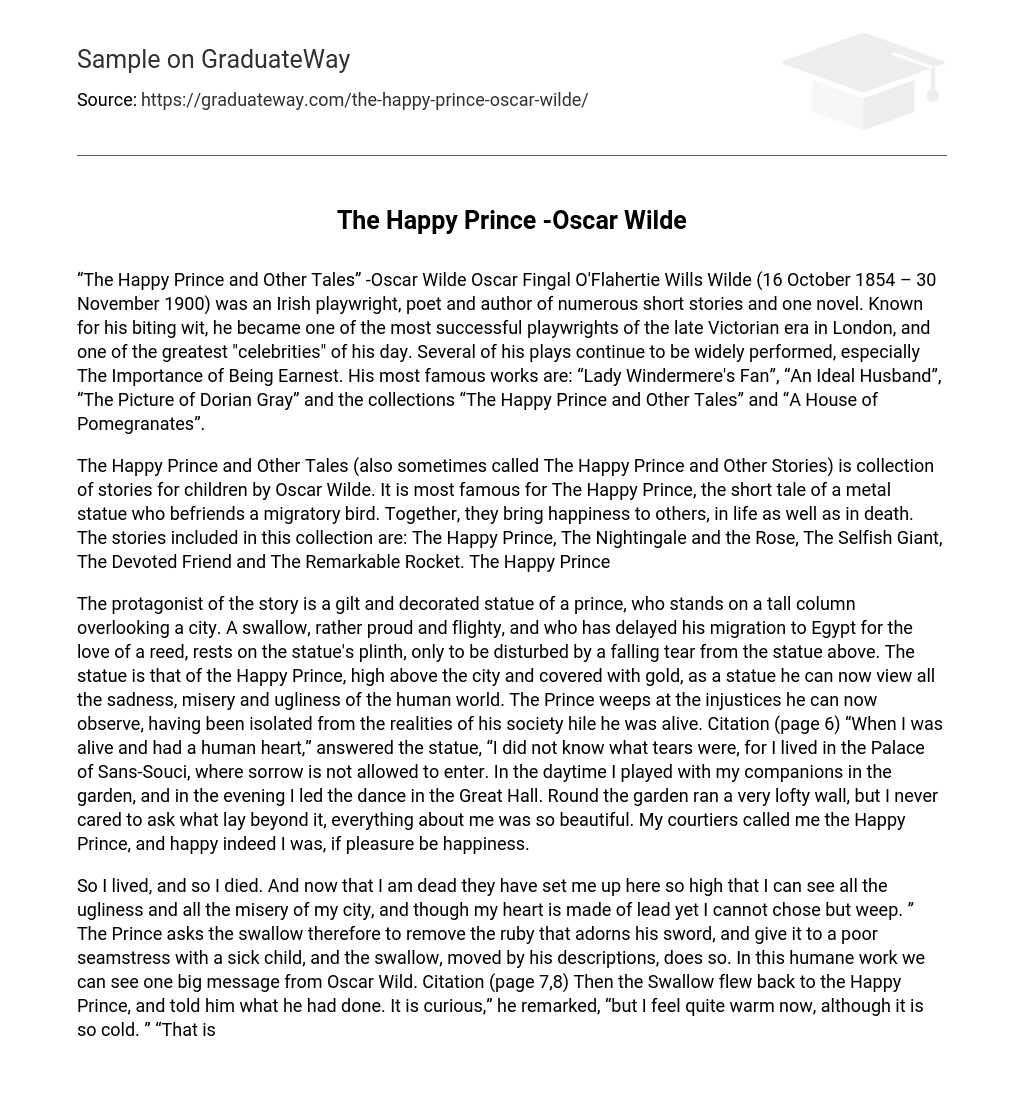“The Happy Prince and Other Tales” -Oscar Wilde Oscar Fingal O’Flahertie Wills Wilde (16 October 1854 – 30 November 1900) was an Irish playwright, poet and author of numerous short stories and one novel. Known for his biting wit, he became one of the most successful playwrights of the late Victorian era in London, and one of the greatest “celebrities” of his day. Several of his plays continue to be widely performed, especially The Importance of Being Earnest. His most famous works are: “Lady Windermere’s Fan”, “An Ideal Husband”, “The Picture of Dorian Gray” and the collections “The Happy Prince and Other Tales” and “A House of Pomegranates”.
The Happy Prince and Other Tales (also sometimes called The Happy Prince and Other Stories) is collection of stories for children by Oscar Wilde. It is most famous for The Happy Prince, the short tale of a metal statue who befriends a migratory bird. Together, they bring happiness to others, in life as well as in death. The stories included in this collection are: The Happy Prince, The Nightingale and the Rose, The Selfish Giant, The Devoted Friend and The Remarkable Rocket. The Happy Prince
The protagonist of the story is a gilt and decorated statue of a prince, who stands on a tall column overlooking a city. A swallow, rather proud and flighty, and who has delayed his migration to Egypt for the love of a reed, rests on the statue’s plinth, only to be disturbed by a falling tear from the statue above. The statue is that of the Happy Prince, high above the city and covered with gold, as a statue he can now view all the sadness, misery and ugliness of the human world. The Prince weeps at the injustices he can now observe, having been isolated from the realities of his society hile he was alive. Citation (page 6) “When I was alive and had a human heart,” answered the statue, “I did not know what tears were, for I lived in the Palace of Sans-Souci, where sorrow is not allowed to enter. In the daytime I played with my companions in the garden, and in the evening I led the dance in the Great Hall. Round the garden ran a very lofty wall, but I never cared to ask what lay beyond it, everything about me was so beautiful. My courtiers called me the Happy Prince, and happy indeed I was, if pleasure be happiness.
So I lived, and so I died. And now that I am dead they have set me up here so high that I can see all the ugliness and all the misery of my city, and though my heart is made of lead yet I cannot chose but weep. ” The Prince asks the swallow therefore to remove the ruby that adorns his sword, and give it to a poor seamstress with a sick child, and the swallow, moved by his descriptions, does so. In this humane work we can see one big message from Oscar Wild. Citation (page 7,8) Then the Swallow flew back to the Happy Prince, and told him what he had done. It is curious,” he remarked, “but I feel quite warm now, although it is so cold. ” “That is because you have done a good action,” said the Prince. The swallow stays with the Prince over the ensuing weeks, each week almost departing for the marvels of Egypt, but each time held by the statue’s pleas , removing the jewels and gold covering the prince’s body, and distributing them in turn among those in need. Each deed brings the swallow to a closer understanding of the beauty and brevity of human life.
Eventually through the long and bitterly cold winter, the Prince is completely denuded of gold and jewels, even as his friendship with the swallow deepens. The swallow, finally, and having stayed for far too long to survive the bitter winter, realizes that he is dying from cold. He returns to say the last goodbye to the Prince, who wishes him joy, and bades the swallow to kiss him on the lips, in farewell. The swallow then does so — but dies, falling at the feet of the statue, even as the Prince’s leaden heart breaks into pieces.
The next day, the Mayor of the city observes the dismal state of the statue, and seeing that it is no longer beautiful, he orders it to be removed and melted down. The Prince’s heart will not melt in the furnace, however, so it is discarded on to the same dust-heap upon which the swallow’s body lies. Citation (page11,12) So they pulled down the statue of the Happy Prince. “As he is no longer beautiful he is no longer useful,” said the Art Professor at the University. Then they melted the statue in a furnace, and the Mayor held a meeting of the Corporation to decide what was to be one with the metal…. …“Bring me the two most precious things in the city,” said God to one of His Angels; and the Angel brought Him the leaden heart and the dead bird. “You have rightly chosen,” said God, “for in my garden of Paradise this little bird shall sing for evermore, and in my city of gold the Happy Prince shall praise me. ” With this tale Oscar Wilde wants to remind the reader that helping other and being human are maybe the noblest features of one man. Only this way people can give sense to the live and warm their hearts.





